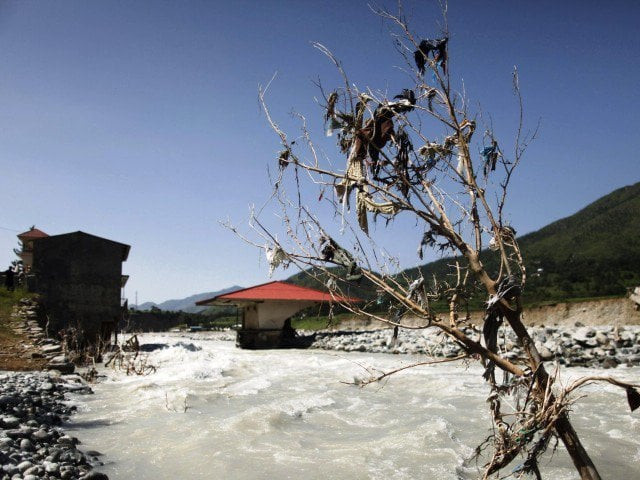‘Soft engineering’ measures : Govt mulling alternative flood management plans
Climate change adviser directs for comparative study on the benefits of different methods

Climate change stock image
PHOTO: REUTERS
Instead, the Pakistan Tehreek-e-Insaf (PTI) government is considering alternative means for flood management, encouraging an integrated approach through soft engineering or non-structural approaches.
In this regard, the Adviser to the Prime Minister on Climate Change Amin Aslam has directed the concerned authorities to conduct a comparative study on the matter, keeping in view the experiences of China and other countries in controlling floods and to submit recommendations for revisions in the incumbent flood control strategy.
“We should focus on the ecological storage of the flood waters, which entails tremendous opportunities and potential like groundwater recharge, flushing of polluted lakes and ponds and for creation of better habitats for migratory birds, with minimal social cost,” he said while chairing a meeting in this regard with officials of the World Wide Fund (WWF) at the Climate Change Ministry on Tuesday.
“We need an integrated and comprehensive approach towards floodplain management to gain maximum benefits and minimise the risk factors with lesser social cost and to use it as a tool for ecosystem-based adaptation of climate change effects,” Aslam said.
Earlier, WWF officials gave a detailed presentation regarding workable and cost-effective strategy for rational use of floods and to plug the wastage of precious resources.
It was detailed that Pakistan is a signatory to the Ramsar Convention, a global platform for conservation and use of wetlands resources. Ramsar
In 2012, the Ramsar Advisory Mission (RAM) visited Pakistan and came up with key recommendations to mitigate damages caused by floods, use floodwater for ground-level recharge, restoration of floodplains and riverine ecosystem through 225 wetlands which cover 780, 000 hectares — or around 10 per cent of the country’s total land mass.
Of these, 19 wetlands were designated as Ramsar sites for having international significance in view of criteria of the Ramsar Convention.
The mission had recommended that extra flood water could be stored in large and medium wetlands along the Indus River. In the of the mission’s recommendations, Rs300 million were allocated under the fourth National Flood Protection Restoration Plain (NFPP) programme of the Rs167 billion required overall.
Unlike China, Pakistan lacks an agency which can deal with wetlands. The draft national forest policy 2015 had recommended that a wetlands management authority be set up.
Published in The Express Tribune, September 5th, 2018.


















COMMENTS
Comments are moderated and generally will be posted if they are on-topic and not abusive.
For more information, please see our Comments FAQ